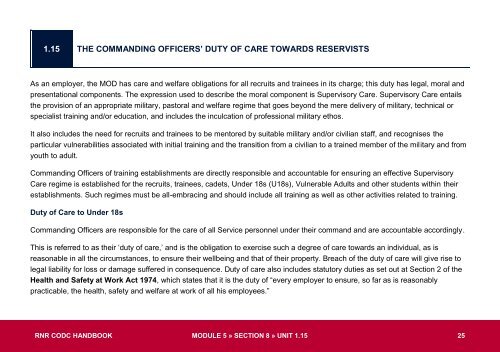RNR CODC Module 5 Handbook
Create successful ePaper yourself
Turn your PDF publications into a flip-book with our unique Google optimized e-Paper software.
1.15 THE COMMANDING OFFICERS’ DUTY OF CARE TOWARDS RESERVISTS<br />
As an employer, the MOD has care and welfare obligations for all recruits and trainees in its charge; this duty has legal, moral and<br />
presentational components. The expression used to describe the moral component is Supervisory Care. Supervisory Care entails<br />
the provision of an appropriate military, pastoral and welfare regime that goes beyond the mere delivery of military, technical or<br />
specialist training and/or education, and includes the inculcation of professional military ethos.<br />
It also includes the need for recruits and trainees to be mentored by suitable military and/or civilian staff, and recognises the<br />
particular vulnerabilities associated with initial training and the transition from a civilian to a trained member of the military and from<br />
youth to adult.<br />
Commanding Officers of training establishments are directly responsible and accountable for ensuring an effective Supervisory<br />
Care regime is established for the recruits, trainees, cadets, Under 18s (U18s), Vulnerable Adults and other students within their<br />
establishments. Such regimes must be all-embracing and should include all training as well as other activities related to training.<br />
Duty of Care to Under 18s<br />
Commanding Officers are responsible for the care of all Service personnel under their command and are accountable accordingly.<br />
This is referred to as their ‘duty of care,’ and is the obligation to exercise such a degree of care towards an individual, as is<br />
reasonable in all the circumstances, to ensure their wellbeing and that of their property. Breach of the duty of care will give rise to<br />
legal liability for loss or damage suffered in consequence. Duty of care also includes statutory duties as set out at Section 2 of the<br />
Health and Safety at Work Act 1974, which states that it is the duty of “every employer to ensure, so far as is reasonably<br />
practicable, the health, safety and welfare at work of all his employees.”<br />
<strong>RNR</strong> <strong>CODC</strong> HANDBOOK MODULE 5 » SECTION 8 » UNIT 1.15 25




